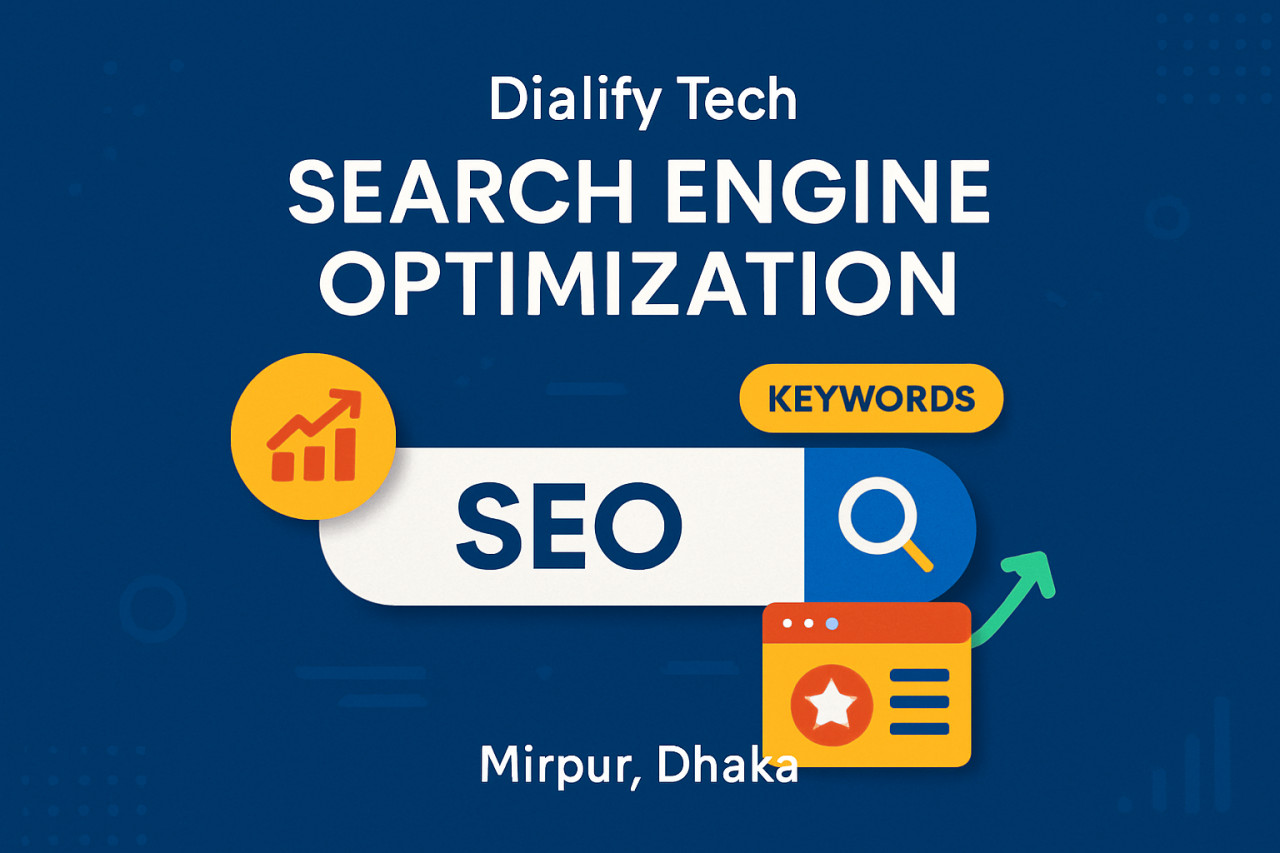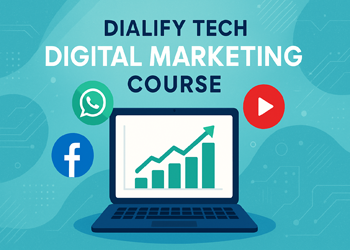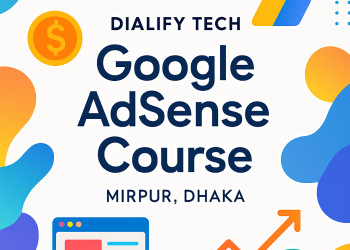
সার্চ ইঞ্জিন অপ্টিমাইজেশন
Dialify Tech – Search Engine Optimization (SEO) Course
Location: Mirpur, Dhaka
Course Overview
This comprehensive SEO course equips individuals, marketers, and business owners with the skills to improve their website’s visibility and ranking on search engines.
Participants will gain hands-on knowledge of on-page optimization, technical SEO, off-page strategies, and analytics, enabling them to drive organic traffic, increase rankings, and achieve measurable results.
Learning Objectives
By the end of this course, participants will be able to:
-
Understand SEO fundamentals and how search engines work
-
Conduct keyword research & analysis to identify profitable opportunities
-
Optimize content, tags, and structure for improved rankings
-
Implement technical SEO best practices (crawlability, speed, mobile-first)
-
Build effective backlink & off-page strategies
-
Use SEO tools to analyze, measure, and report performance
-
Stay updated with latest algorithm changes & trends
-
Develop a professional SEO strategy portfolio
Course Modules & Curriculum
Module 1: Introduction to SEO
-
What is SEO? Importance & benefits
-
How search engines work (crawling, indexing, ranking)
-
Organic vs. paid search
-
Types of SEO: On-page, Off-page, Technical
-
Local, Mobile & Voice SEO (overview)
-
SEO fundamentals: Search intent, ranking factors, algorithm updates
Module 2: Keyword Research & Analysis
-
Role of keyword research in SEO
-
Types of keywords: Short-tail, long-tail, LSI
-
Tools: Google Keyword Planner, SEMrush, Ahrefs, Ubersuggest
-
Analyzing search volume, competition & difficulty
-
Mapping keywords to content strategy
-
Identifying primary vs. secondary keywords
Module 3: On-Page SEO Optimization
-
Content optimization: High-quality, relevant, engaging writing
-
Keyword usage & best practices
-
Title tags, meta descriptions, header tags (H1, H2, H3)
-
Image optimization (alt text, file names, compression)
-
URL structure & internal linking strategy
Module 4: Technical SEO
-
Site structure & hierarchy
-
XML sitemaps & robots.txt
-
Crawlability & indexability (Google Search Console basics)
-
Page speed optimization & Core Web Vitals
-
Mobile SEO & responsive design principles
-
Schema markup & structured data
Module 5: Off-Page SEO & Link Building
-
Role of backlinks & authority metrics
-
Link-building strategies: Guest blogging, outreach, broken links, resource pages
-
Competitor backlink analysis
-
Local SEO: Google My Business optimization, local citations, reviews
-
Social signals & their indirect impact on rankings
Module 6: SEO Tools & Analytics
-
Google Search Console: Monitoring & error resolution
-
Google Analytics: Tracking organic traffic & conversions
-
Rank tracking & reporting tools
-
Advanced tools: SEMrush, Ahrefs, Moz (conceptual overview)
-
Creating SEO reports & data-driven insights
Module 7: Advanced SEO Strategies & Future Trends
-
E-commerce SEO: Product & category optimization
-
International SEO: Hreflang & multilingual sites
-
Voice search optimization for conversational queries
-
AI & machine learning in SEO (RankBrain, BERT, MUM)
-
Preparing for future algorithm updates
-
Building an SEO career: Freelancing, agency work, in-house roles
Project Work
Students will complete a real-world SEO project involving:
-
Keyword research & content mapping
-
Technical SEO audit
-
On-page optimization
-
Link-building strategy creation
-
Performance analysis with Google Search Console & Analytics
👉 Final deliverable: A comprehensive SEO strategy document & performance report
Tools Covered
-
Google Search Console
-
Google Analytics
-
Google Keyword Planner
-
WordPress (or other CMS)
-
Screaming Frog SEO Spider (conceptual overview)
-
SEMrush / Ahrefs / Moz (conceptual overview)
Target Audience
-
Website owners, bloggers & content creators
-
Digital marketers & marketing professionals
-
Entrepreneurs & small business owners
-
Anyone seeking to improve online visibility & traffic
Prerequisites
-
Basic computer & internet literacy
-
Familiarity with websites/online content
-
Interest in digital marketing & analytics
Certification
✔ Participants will receive a Dialify Tech SEO Certification upon course completion and project submission.








